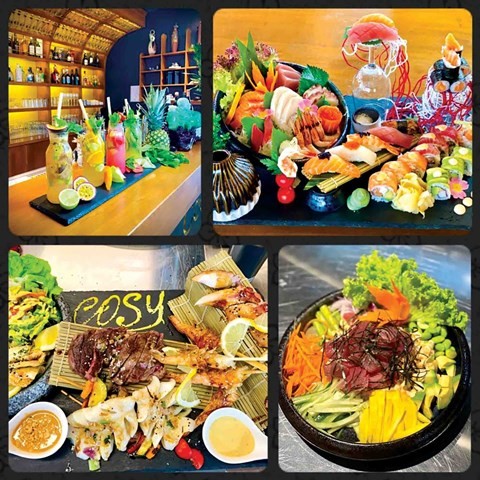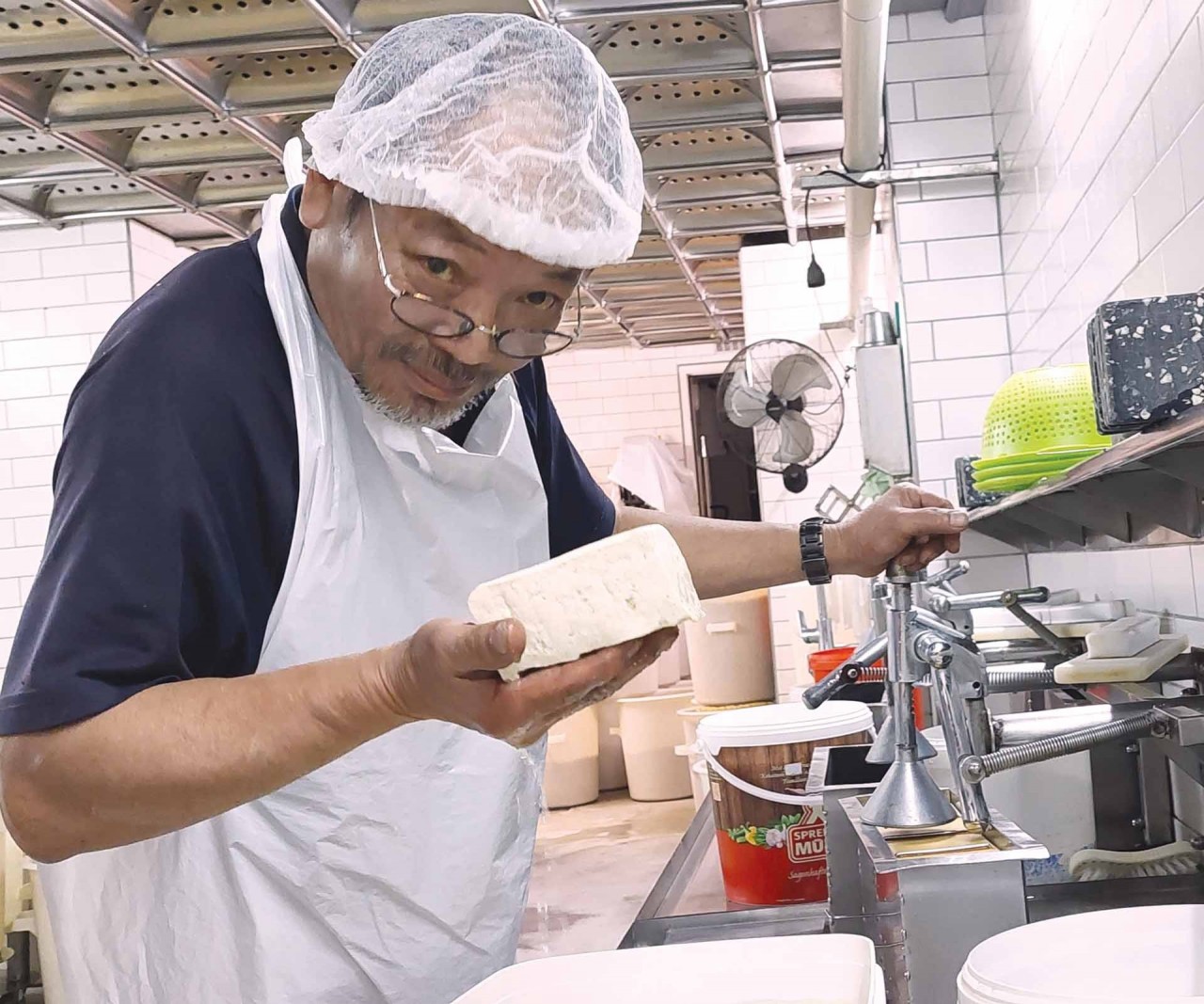
A journey to taste Vietnamese cuisine in Germany
Latest
 |
| A Journey to taste Vietnamese cuisine in Germany: Dishes created by overseas Vietnamese at Cozy Restaurant - Fine Asia Cuisine & Sushi Bar in Nurnberg, Germany. (Photo: WVR/Cat Phuong) |
Leaving Hanoi for Germany in the days when the whole of Europe was covered in colorful blossom, I felt craved for the taste of Vietnamese cuisine as if I had been away from home for a long time.
If 20-30 years ago, Vietnamese expats missed the taste of their homeland agonizingly, but now they can subdue that nostalgia when it is easy to find Vietnamese restaurants everywhere in Germany.
Popular and familiar
When the plane landed in Frankfurt Airport, I had an opportunity to talk with Mr. Kambiz Ghawami, President of the World University Service (WUS) of Germany. Suprisingly, over a cup of hot brown coffee "portable" from Vietnam, our chatting had become quite a bit more for Vietnamese cuisine.
Mr. Kambiz Ghawami is a German friend of Vietnam, who has devoted for and engaged with education in Vietnam. Every year, he has several flights back and forth between the two countries to implement support WUS’s projects. He is not a stranger to favorite Vietnamese dishes in Germany.
“In Germany, there are more and more Vietnamese families who live to the second and third generations. If 20 years ago, there were only a few Vietnamese restaurants, now, event in small provinces, you can also find Asian restaurants owned by Vietnamese people. That shows that Vietnamese cuisine in Germany has developed very strongly over the years,” said Mr. Gawami.
As the traveling between the two countries becomes more and more convenient, many Germans travel to Vietnam and are very fond of local dishes. Therefore, when they return to Germany, most of them want to enjoy it again and thanks to that, Vietnamese dishes became popular in Germany.
In Germany, many families have the habit of eating out and taking their children to Vietnamese restaurants. When the children get used to the taste, their families often come back to eat and order food for the children and even when they grow up, their taste for Vietnamese food remains the same. Over the past few decades, that is how Vietnamese cuisine has been spreading out, becoming familiar to generations of locals.
When in Rome do as Romans do
Chef and owner Trinh Thanh Son, an overseas Vietnamese living in Germany since 1990, shared: “I have no formal training in cooking, but I have lived here and worked for a long time in a restaurant. When I mastered with cooking skills, I opened Asia Bao restaurant in Munich.”
 |
| Asia Bao restaurant of overseas businessman Trinh Thanh Son is located on the first floor of a large building in Munich, Germany. (Photo: WVR/Minh Hoa) |
Mr. Son said: “If you want to open a restaurant, you have to take a food safety class. Here in Germany, this requirement is very strict, any wrong doing is severely fined, and repeating offences must face with the closure. Therefore, opening a restaurant has to ensure food safety and follow many other regulations."
He recalls 30 years ago, Germans didn't know what Vietnamese cuisine was because at that time there were only Chinese restaurants in Germany. “Nowadays, there are Vietnamese restaurants everywhere, a small village has one, a big village has two or three, a city has a few dozen. Now, when the Germans enter the shop, they usually ask: "Are you Vietnamese?" and only then they decide to choose a table and order food. They are so "stylish" that when they call us to deliver “pho” (rice noodlle soup) to their house, they will tell us to keep the soup and the noodle ingredients separate so that when eating, they will heat up and then pour the soup into the noodle and eat it hot.", he added.
Variations
Leaving Frankfurt and Munich, I arrived in Berlin in cool, chilly weather. Turning into Chikenbuzz for a breakfast, I was extremely impressed with the chicken “xa xiu” (char siu) and especially the salad with typical Vietnamese coconut milk. Hoang Trong, the owner of the restaurant said: “This is the third restaurant that I and my friends have opened, each has about 20 employees. We serve Asian chicken dishes as well as European dishes. We are going through a difficult COVID-19 pandemic period, but fortunately our regular customers still call us to deliver food to their home. It's nice when someone calls and asks: is Trong there? If yes, cook me a bowl of “pho”, I'll come over to eat."
Having moved to Germany since 1990, chef Nguyen Huy Nhu in Berlin used to work as an assistant for Chinese, Japanese and Thai restaurants. Every workplace move is a new “hands-on course” for him. He said: “Vietnamese eateries account for 70% of the market share of Asian restaurants in Berlin today. Vietnamese people know how to create dishes to suit local tastes. For example, the Chinese like to use Monosodium glutamate, the Vietnamese use sugar. With fish sauce dipping “bun cha” (grilled minced pork and rice vermicelli), you have to mix dozens of liters every day because Germans eat a lot of dipping sauce. There was a German friend who came to eat, liked the taste of the sauce very much, but hated the smell of fish sauce. So I thought of a way to make the sauce without the smell of fish."
In Germany, many dipping sauces have been created by the owners to made a signature for their restaurants. For example, the combination of German Mayonaise, adding a bit of Vietnamese spices and mixing it in a Vietnamese way has produced a delicious and spicy Hai Dang (Hai Dang is the name of the restaurant) sauce that makes many Germans fascinated.
In addition to traditional dishes such as “bun” (rice vermicelli) and pho, Nguyen Nhu also has sticky rice with beans, peanuts, corn and glutinous rice sold as a set rice dishes, served with spring rolls, and added tofu like a vegetarian style that makes Germans very happy.
 |
| Overseas Vietnamese businessman Nguyen Quoc Khanh, the owner of a tofu factory in Berlin. (Photo:WVR/Minh Hoa) |
When it comes to tofu, no one in Berlin does not know Mr. Quoc Khanh, who came to Germany to start a career as a bean maker in 1999 and now supplies tofu to almost all of East Germany. Recalling the days when he first came to Germany to set up a business, not all Germans liked to eat tofu, so he faced with many difficulties. Gradually, the Germans learned to eat beans and enjoyed them very much. Vegetarian shops sprang up like mushrooms, since then, his bean factory has not kept up with the demand. Some days, the factory processes tons of beans, producing about 3-4 tons of finished beans. This is a dream number for even individual tofu factories in Vietnam, not to mention one in Germany.
If we say about delicious and beautiful Asian cuisine in Nuremberg, people mention the Cozy restaurant chain - Fine Asia Cuisine & Sushi Bar and the restaurant owners Vu Tien Thanh and Nguyen Nam Son.
They shared: “The restaurant has Vietnamese and Asian dishes, from Sushi to hot dishes according to the tastes of today's diners. All are made with Asian ingredients according to the restaurant's own recipe with 30 years of experience in food industry. For example, Sommerrolle - Vietnamese spring rolls, the combination ChefMix Nr 305 is very popular with customers."
Time flew fast, the trip combined with working in Germany has reached the end of the schedule in the blink of an eye, I regret not being able to enjoy all the variable novelties in Vietnamese cuisine prepared by overseas Vietnamese chefs here. There will be people who think that culinary variation is losing the traditional flavor. However, perhaps, everything in life will move to an adaptation, Vietnamese cuisine abroad too. To me, this process is really interesting.













